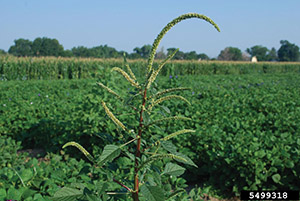Eco Solutions Answer to Herbicide Resistance
 |
|
One of the worst glyphosate-resistant weeds is Palmer amaranth. http://neipmc.org/go/eCTp Source: Howard F. Schwartz, Colorado State University, Bugwood.org |
In 2012, David Mortensen and his colleagues published a seminal paper about a problem: a dramatic rise in the number and extent of weed species resistant to glyphosate, a widely-used herbicide.
A little more than a decade earlier, the widespread adoption of genetically modified crops resistant to glyphosate (marketed by Monsanto as Roundup Ready crops) captured the minds of farmers and investors alike, in the agricultural equivalent of a blockbuster movie or drug.
Mortensen, a weed ecologist at Penn State, argued that the herbicide-and-seed package promoted by industry was not only doomed to fail as a weed control strategy, it was unsustainable, and worse yet, harmful to ecological systems.
Early warnings
Mortensen and other ecologists voiced concerns from the beginning with industry plans. He believed growers would use the technology on a mass scale and that such use would quickly lead to herbicide resistance in target weeds.
Even so, industry moved ahead, developing glyphosate-resistant soybeans, then resistant corn, then resistant alfalfa, and then resistant sugar beets. Overreliance on glyphosate is the problem. Last year, over ninety percent of the soybeans grown in the US were genetically modified to be resistant to glyphosate. Eighty percent of the corn. Therefore, even when growers are rotating their crops, each year they would be returning to the same seed type calling for the same “single bullet,” the glyphosate-resistant weed strategy.
“By turning to the same chemical strategy every year, we saw a very real likelihood that selection pressure from this single tool, glyphosate, would be great,” Mortensen said. “I was interested in diverse, ecologically-informed agricultural management. A diverse approach mimics how nature works.”
“We must move toward cropping systems that favor and enhance ecosystem services and away from stand-alone action against weeds using single-bullet approaches,” Mortensen said.
Other ecosystem services, apart from suppressing weeds, are increasing organic matter, enhancement of soil, retention of nitrogen—not sending it in the form of agricultural runoff into the Chesapeake Bay. Crop yield is a type of ecosystem benefit, but our agricultural system, he says, needs to deliver these other ecosystem services, too.
Misleading
To address glyphosate resistance, industry has developed new genetically modified crop cultivars that are resistant to other traditional herbicides, among them dicamba and 2,4-D, but, Mortensen and others have argued, this is not sustainable. Much like playing with fire, the longer you are at it, the more likely you are to get burned.
“These so-called solutions, of adding 2,4 D and dicamba in soy and corn cropping systems, are not robust enough against evolutionary weed resistance,” Mortensen said.
Mortensen and his team recommend a solution of integrated weed management (IWM) practices—using multiple approaches that are knowledge-based and rely on ecological principles.
Debunking the Single Bullet Theory
More than 200 weed species have been reported to have developed resistance to 155 different herbicides in 61 countries and 66 crops, according to the International Survey of Herbicide Resistant Weeds.
Mortensen would like to see fees from the sale of chemicals and biotechnology seeds be directed toward public university research and education that promote adoption of IPM and IWM among farmers.
Mortensen’s biggest question these days is this: How do we make more room at the table for people with diverse points of view? In politics, as in ecology, single bullets fail. And scientists like Mortensen are taking cues from nature, which uses abundance and diversity to proliferate and accomplish work.
— by CHRIS GONZALES
The Northeastern IPM Center promotes integrated pest management for reducing risks to human health and the environment. If republishing our news, please acknowledge the source (“From Northeast IPM Insights”) along with a link to our website.
